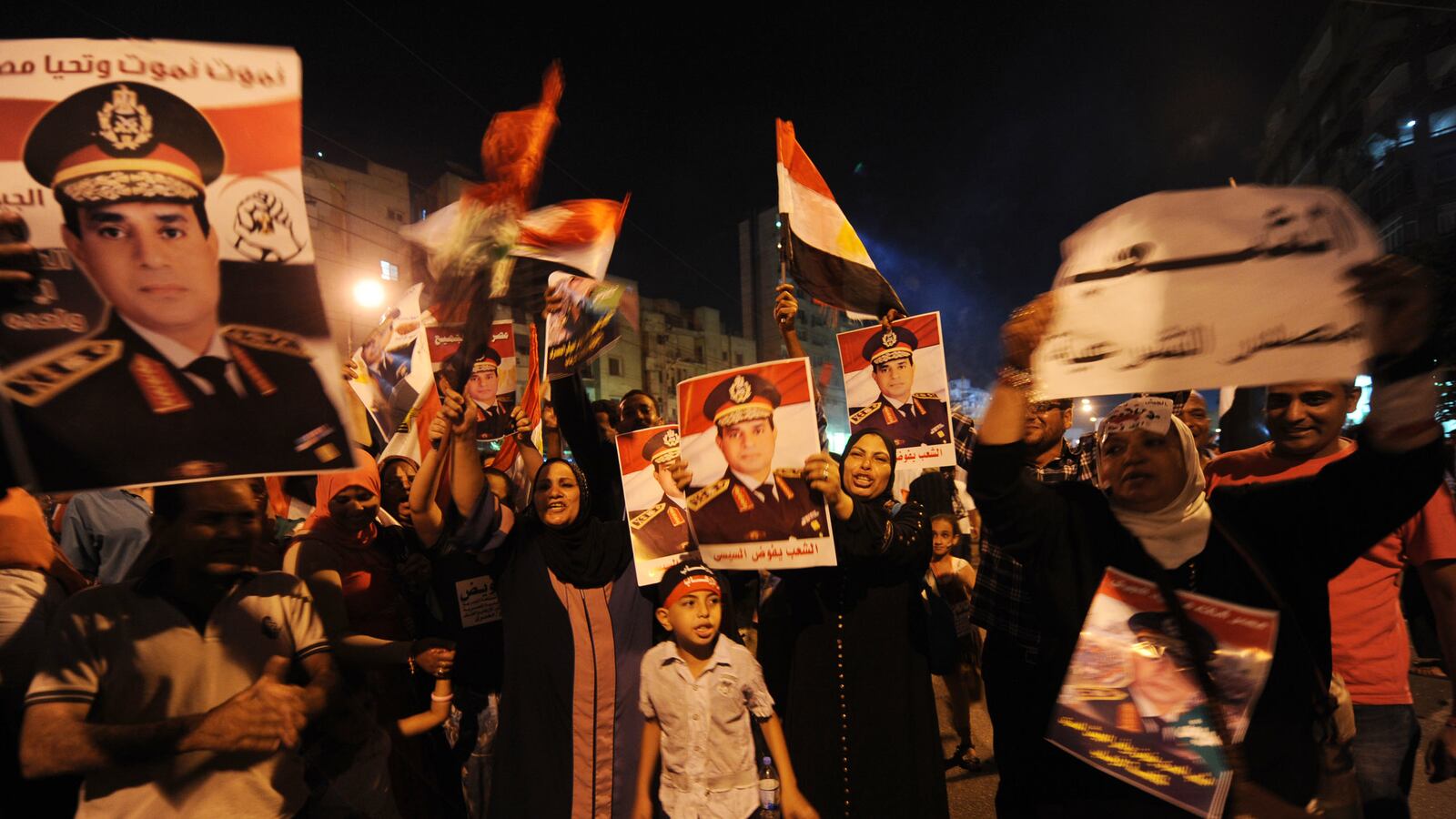When Egypt’s Army chief, Gen. Abdel Fattah al-Sisi, wanted mass demonstrations last week, he asked for them.

Al-Sisi has cited the millions who protested against former president Mohamed Morsi as justification for ousting him July 3. Last Wednesday al-Sisi called the protesters back into action, asking Egyptians in a televised speech to stage rallies to give him a “mandate” to crack down on “terrorism”—which was understood to be a reference to Morsi’s supporters. Two days later the streets filled again.
Al-Sisi’s call last week added a stark new feature to Egypt’s ongoing crisis. But some anti-Morsi activists and politicians say the Army began encouraging protests behind the scenes long before al-Sisi was so publicly leading the charge. They say the Army sent messages to the opposition urging them to take to the streets—signaling that, if their numbers were big enough, the Army might take their side.
Some of Morsi’s backers have accused the Army of a conspiracy, saying that it helped along the same protests that sparked Morsi’s removal. But the anti-Morsi sources say the Army offered only moral support—which came in meetings with military officials and from intermediaries speaking on the Army’s behalf. This coincided with a public change in tone from Army leaders and spokesmen who made statements suggesting that its commitment to Morsi might be wavering.
The shift from the Army, both in public and in private, began early this year—at a time when public anger at Morsi and his Muslim Brotherhood was widespread and growing, and many protesters were already calling for the generals to sweep them from power. Activists say the realization that the Army could help them oust Morsi was an important turning point in their battle against a president they viewed as increasingly authoritarian and bent on holding onto power at any cost.
One prominent activist in Cairo recounts meeting with military intelligence officers regularly after Morsi’s inauguration last June. The meetings were straightforward, with the officers identifying themselves by name and rank. The Army, the activist says, seemed eager to develop better ties with liberal groups after suffering through bruising battles with protesters in the 16 months it ran the country before handing Morsi the reins. “They were building a bridge,” says the activist, who requested anonymity to discuss the private meetings.
Protests against Morsi raged with increasing intensity as he pushed through his term. His battles with the opposition reached a boiling point late last year, when Morsi briefly granted himself extrajudicial powers to push through a new Islamist-penned Constitution. Mass demonstrations erupted at the announcement and continued to spiral, occasionally leading to bloodshed, as the idea of the military removing him gained currency among protesters.
To many anti-Morsi activists, however, it remained unclear where the Army stood. It seemed wary of reentering politics, and after Morsi and his allies came to power, they kept the military free from civilian oversight and allowed its sprawling financial interests to remain intact. It was Morsi himself, meanwhile, who’d installed al-Sisi as Army chief.
For months, the Cairo activist says, the military officers remained vague on the question of the Army’s support for Morsi. Then, in March, the message changed. The Army had heard the calls of the protesters asking it to act, the officers said—and it was willing to do so if the opposition could lead a large-scale movement pushing for Morsi to go. “They said, ‘Move first, and we will be there,’” the activist recalls. “And they kept their word.”
According to the activist, the officers said the Army would offer no direct help, other than working through the media in “preparing public opinion for accepting the military’s return.” As the Army’s signals in the press and messages from private meetings with opposition members filtered out, they gave the anti-Morsi movement a confidence boost. “When they said, ‘Good idea; go ahead with it,’ this actually gave a very strong push to the movement,” the activist says.
Politicians received this message too—though some think the Army was simply playing both sides. “I was informed that if people are in the streets, [the Army] will support them,” says Farid Zahran, a leader of the Egyptian Social Democratic Party. “And by the way, if the streets were Muslim Brotherhood, it would have supported the Muslim Brotherhood.”
One well-connected liberal politician, who also requested anonymity, says an Army official made the military’s message to the opposition clear during a meeting earlier this year. “The general said that [Morsi’s] ‘gang’ is a danger to the national security of this country, and that they can’t leave them to destroy it and make it a part of their silly Islamic project,” the politician says.
Yasser Rizq, the editor in chief of the influential Egyptian newspaper Al-Masry Al-Youm, says he brought a similar message from the Army to the opposition. “In January there were communications between generals in the Army and myself. They told me the intervention of the Army is inevitable, and is just a matter of time, because of the rage regarding Morsi’s performance on both the internal and external scenes,” Rizq says. “I transferred this message to leading figures of [Egypt’s main opposition coalition] the National Salvation Front and the revolutionary youth.”
Rizq also spread the message in his writing, which is widely read. On March 11, he penned a column titled, “When Will the Army Take to the Street?” In the column, Rizq recounts, “I said that the Army will not take such an action except if it has to do so in response to national duty, as it then will not be breaching its oath. I said the Army listens to the voice of the masses, and most probably there would be early presidential elections. I said I almost see the explosion.”
The grassroots protest movement that eventually sparked Morsi’s ouster, called Tamarod, began in May as a signature drive calling for early elections. Rizq says Tamarod held its first press conference at Al-Masry Al-Youm’s headquarters.
Rizq says the Army didn’t lend any direct support to Tamarod, though some press reports have suggested otherwise. Activists say the signals of support from the Army were helpful on their own. Hossam Moenes, a youth activist who worked closely with Tamarod, calls them “extremely important,” saying this let the group know to set its sights on Morsi’s removal—a cause that resonated with Egyptians who badly wanted him gone.
Al-Sisi has installed a civilian government to oversee plans for a transition to new elections and has been careful to stress that protesters are leading the way. But Eric Trager, an Egypt specialist at the Washington Institute for Near East Policy, says al-Sisi’s call to protest last week suggests that the Army intends to play a more aggressive and up-front political role. “The military saw that there was mass anger, saw the emergence of a new protest movement calling for a takeover, and encouraged it,” Trager says. “Now that it’s seized that momentum, it intends to stay very active in the political game.”







